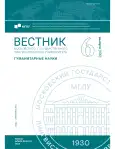Featuers of Figurative Meanings of Regional Names of Folk Costumes (based on the German Language)
- 作者: Blokhina E.N.1, Nefedova L.A.2
-
隶属关系:
- MGIMO-University
- Moscow Pedagogical State University
- 期: 编号 6(900) (2025)
- 页面: 24-32
- 栏目: Linguistics
- URL: https://bakhtiniada.ru/2542-2197/article/view/301074
- ID: 301074
如何引用文章
全文:
详细
The aim of this study is to identify figurative meanings of names of folk costume items in Southern Germany and Austria (hyponyms) in comparison with names of clothes in the literary language (hypernyms) based on reference books on allegorical means of expression in the German language and German-language texts from the DeReKo electronic corpus. The work uses the methods of continuous sampling, inductive generalization, corpus analysis, linguacultural commentary. The nature of coincidences at two levels of language is studied and patterns of formation of proper figurative meanings of hyponyms and their functions in speech are revealed.
作者简介
Elena Blokhina
MGIMO-University
编辑信件的主要联系方式.
Email: e.blochina@my.mgimo.ru
PhD (Philology), Associate Professor, Associate Professor of the Department of German
俄罗斯联邦Lyubov Nefedova
Moscow Pedagogical State University
Email: la.nefedova@mpgu.su
Doctor of Philology (Dr. habil.), Professor, Head of the German Language Department
俄罗斯联邦参考
- Bondarchuk, G. G., Gorozhanov, A. I. (2024). Representation of the category of clothing names in American linguoculture (corpus-based research). Humanities and law research, 11(4), 780–787. (In Russ.)
- Kovshova, M. L. (2017). On the problem of cultural reference of proverbs (the Russian proverbs with images of clothing). Slovo.ru: baltijskij accent, 8(3), 67–93. (In Russ.)
- Bankova, T. B., Vasil’kovskaya, A. A. (2019). Clothing code in dialectal linguaculture (based on the dialectal material of the Middle Ob River). Tomsk State Pedagogical University Bulletin, 7(204), 48–54. (In Russ.)
- Yusupova, L. G., Kuz’mina, O. D., Kuznetsova, I. I. (2020). Semantic Peculiarities of Phraseological Units with the Component “Clothes” in the English, German and Russian Language. Philology. Theory & Practice, 13(3), 290–294. (In Russ.)
- Anorkulov, S. I. (2022). German idioms with clothing items in comparative translation from German to English. Protsvetanie nauki, 7(13), 57–66. (In Russ.)
- Ovsienko, T. V. (2023). Language representation of the conceptual component of the concept Volkstracht in German linguoculture. The world of science, culture and education, 5(102), 338–340. (In Russ.)
- Karasik, V. I. (2009). Yazykovye klyuchi. Moscow: Gnozis. (In Russ.)
- Karasik, V. I., Slyshkin, G. G. (2007). Bazovye kharakteristiki lingvokul’turnykh kontseptov. In Antologiya kontseptov (pp. 12–13). Moscow: Gnozis. (In Russ.)
- Grekova, M. V. (2016). Figurative lexicography and its place in modern Russian philology. Russian Journal of Lexicography, 2(10), 18–40. (In Russ.)
- Yurina, E. A. (2023). Lexicographic modeling of the figurative system of language. Tula Scientific Bulletin. History. Linguistics, 3(15), 195–205. (In Russ.)
补充文件










